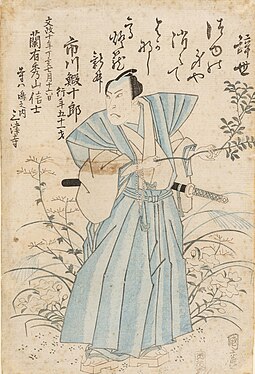Shini-e

Shini-e (死絵, "Memorial prints"), also called "death pictures" or "death portraits", are Japanese woodblock prints,[1] particularly those done in the ukiyo-e style popular through the Edo period (1603–1867) and into the beginnings of the 20th century.
When a kabuki actor died, memorial portraits shini-e were conventionally published with his farewell poem and posthumous name.[2]
Memorial portraits were created by ukiyo-e artists to honor a colleague or former teacher who had died.
Gallery
- Hiroshige by Kunisada, 1858
- Kunisada by Toyohara Kunichika, 1864
- Iwai Hanshirō VIII, by Toyohara Chikanobu 1882
- Ichikawa Ebijuro I by Utagawa Kunihiro, 1827.
See also
References
- ^ Takeuchi, Melinda. (2005). "Shini-e (Memorial Pictures)," in The Hotei Encyclopedia of Japanese Woodblock Prints, p. 594.
- ^ Keyes, Roger et al. (1973). The Theatrical World of Osaka Prints, p. 320; Chin, Connie and Melinda Takeuchi. "Actors' Death Prints: Discovery of a New Genre." Archived 2012-10-23 at the Wayback Machine Horizons (Center for East Asian Studies, Stanford University) Fall 2005, p. 7.
Bibliography
- Keyes, Roger S. and Keiko Mizushima. (1973). The Theatrical World of Osaka Prints: a Collection of Eighteenth and Nineteenth Century Japanese woodblock Prints in the Philadelphia Museum of Art.Philadelphia: Philadelphia Museum of Art. OCLC 186356770
- Newland, Amy Reigle. (2005). The Hotei Encyclopedia of Japanese Woodblock Prints. Amsterdam : Hotei. ISBN 9789074822657; OCLC 61666175





